![]()
Sun, Jan 15, 2012
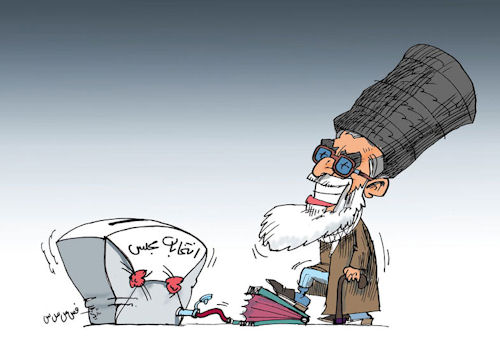
the Supreme Leader's prediction of a high turnout for the Parliamentary elections in March. (Cartoon by Nikahang Kowsar; Rooz Online, January 10, 2012)
Iran’s 2012 Parliamentary Elections: first vetting stage ends; Khamenei calls for mass participation
This article was originally published in the Meir Amit Intelligence and Terrorism Information Center’ bulletin on Iran, number 150.
The first stage in the vetting of candidates for the Majles elections by the Interior Ministry came to an end this week. The chairman of the Interior Ministry’s election headquarters in Tehran Province, the largest constituency, reported Tuesday, January 10, that 747 of the 1,066 candidates who registered in the province were approved. In an interview given to Fars News Agency, Safar-Ali Baratlou reported that 319 candidates were disqualified or announced that they would not be running in the elections (Fars, January 10).
Over 30 current Majles members were disqualified, including Ali Motahari, considered one of President Ahmadinejad’s most notable critics in the conservative camp. He was disqualified under section 28 of the elections law, which requires all candidates to be committed to Islam, the regime, the constitution, and the principle of “rule of the religious jurisprudent”. Hamid-Reza Katouzian, another of the president’s critics, and reformist Majles member Dariush Qanbari were disqualified as well. A number of candidates affiliated with the right wing of the reformist bloc were approved, however, including Mohammad-Reza Tabesh, Mohammad-Reza Khabbaz, Mohammad-Reza Sajadian, Mohammad-Hossein Moghimi, and Mostafa Zolqadr (Khabar Online, January 10). Candidates whose nomination was rejected have four days (until January 14) to appeal. Final decisions on approving candidates are made by the Guardian Council.
Meanwhile, top regime officials are stepping up efforts to ensure the highest possible voter turnout in the March 2 elections. This week Supreme Leader Ayatollah Ali Khamenei called for mass participation in the elections. In a speech given to thousands of Iranians in the city of Qom, Khamenei stressed that massive participation in the elections will reflect the people’s partnership in deciding the fate of their country and will be a crushing blow to Iran’s enemies, whom he accused of trying to keep the citizens from taking part in the elections (Fars, January 9).
Militant Clergy Association member Hojjat-ol-Eslam Hossein Ebrahimi also called on Iranians to take part in the elections in order to thwart the conspiracies of the country’s enemies and express the legitimacy of the regime (ISNA, January 10).
Voter turnout in Iran’s parliament elections
| Election year | Population of Iran | Number of eligible voters | Number of actual voters | Voter turnout |
|---|---|---|---|---|
| 1979 | 37,714,000 | 20,857,000 | 10,875,969 | 52% |
| 1984 | 45,798,000 | 24,143,000 | 15,607,306 | 65% |
| 1988 | 51,909,000 | 27,987,000 | 16,714,281 | 60% |
| 1992 | 56,656,000 | 32,465,000 | 18,767,042 | 58% |
| 1996 | 59,187,000 | 34,716,000 | 24,672,386 | 71% |
| 2000 | 63,152,000 | 38,726,000 | 26,082,157 | 67% |
| 2004 | 67,315,000 | 46,351,000 | 23,734,677 | 51% |
| 2008 | 71,532,000 | 43,824,000 | 22,350,254 | 51% |
Source: Khabar Online, December 27, 2011
Top officials in the conservative camp once again issued a warning about the ongoing internal power struggles between the conservatives ahead of the elections. Habibollah Asgaroladi, a high-ranking member of the Islamic Coalition Party, said that Iran’s enemies are trying to create conflicts among the conservatives to diminish their power, and called for solidarity in the conservative camp. Former Majles Speaker Gholam-Hossein Haddad Adel, who announced he is going to run in the coming elections on behalf of the United Conservative Front, also warned about the danger of internal disagreements. Speaking at a conference held in Esfahan, Haddad Adel said that the elections must not become a scene of internal struggle, since the most important principle for all conservatives is to be true to the rule of the religious jurisprudent and to the Supreme Leader.
Ali-Reza Zakani, chairman of the United Conservative Front’s election headquarters, said this week that the conservatives are currently facing two main adversaries: “the seduction faction” (Jaryan-e Fetneh, a derogatory term to refer to the reformist opposition) and “the deviant faction” (Jaryan-e Enherafi, a derogatory term to refer to President Ahmadinejad’s allies and his office chief Rahim Masha’i). He said that the “deviant faction”, which isn’t loyal to the values of the revolution and does not obey the Supreme Leader, uses the resources it has available to influence the elections (Fararu, January 7).
In addition to the political conflict between the United Conservative Front and the Steadfast Front (Jebhe-ye Paydari), supported by radical cleric Ayatollah Mohammad-Taqi Mesbah Yazdi, differences of opinion have also emerged between Steadfast Front activists and President Ahmadinejad’s supporters. Steadfast Front member Ali-Asghar Zare’i announced this week that his fellow front members will not agree to run in a joint list with government supporters. When asked by the Khabar Online website whether the Steadfast Front had negotiated with the president in an attempt to define boundaries between the front and “deviant faction” activists, Zare’i said that it had not. He noted even if President Ahmadinejad renounces his controversial office chief Rahim Masha’i, the front will not agree to participate in a joint list with government supporters. According to Zare’i, while the front does support the government’s positive activity, it does not accept its flawed conduct on certain issues (Khabar Online, January 8).



 RSS
RSS

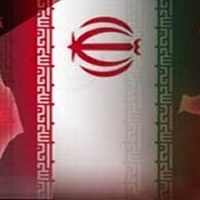
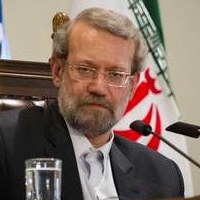
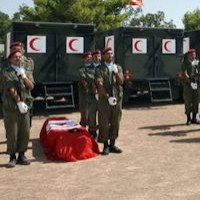

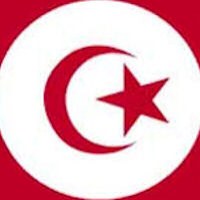




Iran’s 2012 Parliamentary Elections: first vetting stage ends; Khamenei calls for mass participation http://t.co/87kjiabk
Iran’s 2012 Parliamentary Elections: first vetting stage ends; Khamenei calls for mass participation http://t.co/87kjiabk